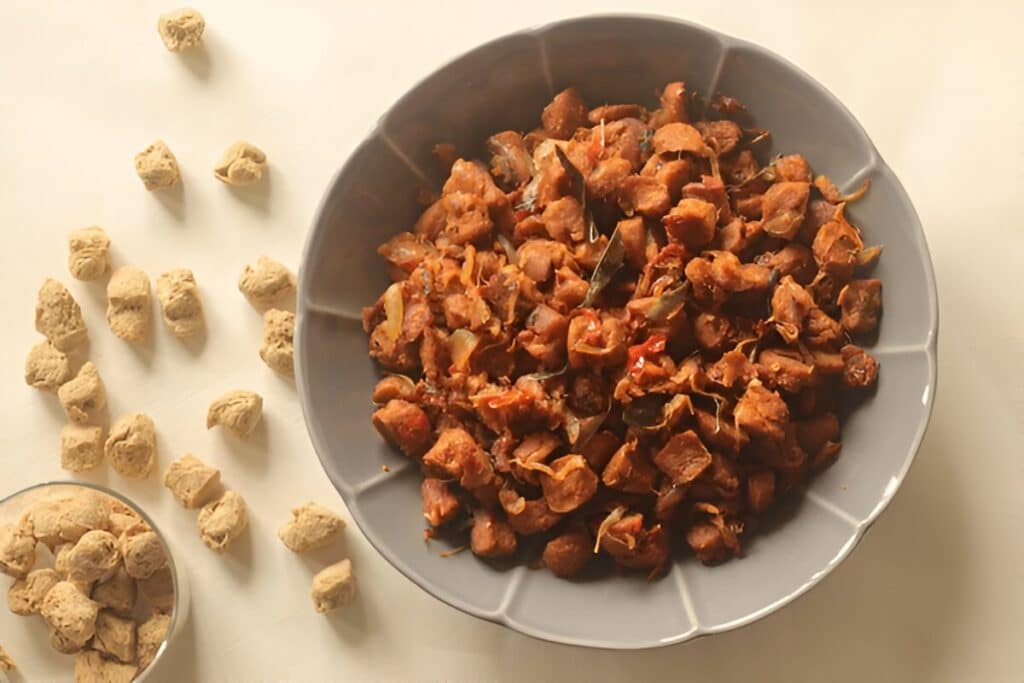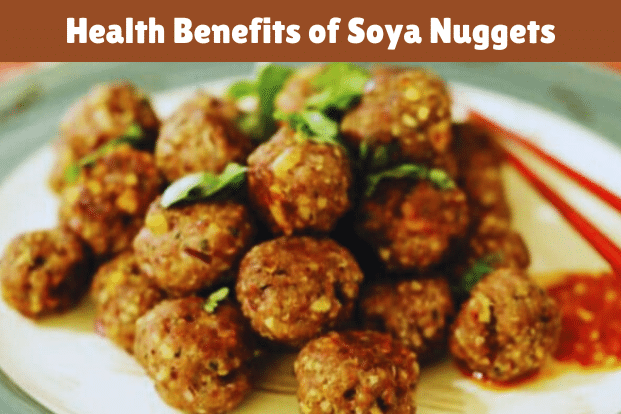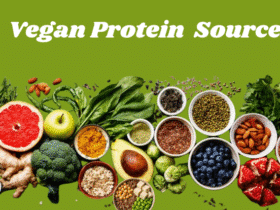Introduction
Soya nuggets – those tiny protein-packed balls that turn deliciously chewy after soaking – are becoming a staple in modern kitchens. But have you ever wondered how healthy they really are? Or how they compare to the original soya beans they come from?
Let’s break it all down. From nutrition and health benefits to how often you should actually eat them, this guide will give you the real scoop on soya nuggets. Ready?

Understanding the Basics
What are Soya Beans?
Soya beans are legumes packed with protein, fiber, and a wide variety of essential nutrients. Used widely across the world in tofu, tempeh, soy milk, and more, they are a powerhouse of plant-based nutrition.
What are Soya Nuggets?
Soya nuggets are made by extracting soya flour from defatted soya meal, then processing it into small, dense chunks. They’re dehydrated and need to be soaked before cooking. They’re also known as textured vegetable protein (TVP).
How are Soya Nuggets Made?
The process is pretty fascinating. Soya oil is first removed from soybeans, leaving a high-protein residue. This is then heated, pressurized, and texturized into chunks, creating a meat-like bite and texture – minus the animal.
Nutritional Breakdown
Nutritional Content of Soya Beans (per 100g):
- Protein: 36g
- Carbohydrates: 30g
- Fat: 20g
- Fiber: 9g
- Iron: 15.7mg
- Calcium: 277mg
- Calories: ~446 kcal
Nutritional Content of Soya Nuggets (per 100g, dry):
- Protein: 52g
- Carbohydrates: 33g
- Fat: 0.5g
- Fiber: 13g
- Iron: 12mg
- Calcium: 350mg
- Calories: ~345 kcal
Key Differences in Nutrition
While soya beans have more healthy fats and overall calories, soya nuggets are denser in protein and fiber after processing. The oil-removal process gives nuggets a leaner nutritional profile—great for high-protein, low-fat diets.
Health Benefits of Soya Nuggets
Excellent Source of Plant Protein
Each bite is loaded with quality protein – vital for vegetarians and fitness lovers alike. It supports muscle recovery and keeps you full longer.
Aids in Muscle Growth and Repair
The high protein content makes soya nuggets perfect for post-workout meals. They help rebuild muscles and reduce fatigue.
Helps in Weight Management
Low in fat and high in fiber, soya nuggets curb hunger and boost metabolism – a perfect combo for weight watchers.
Lowers Bad Cholesterol (LDL)
Soya contains isoflavones that help reduce LDL (bad) cholesterol while maintaining HDL (good) cholesterol – protecting your heart in the long run.
Supports Heart Health
Soya protein is linked to reduced blood pressure and improved arterial health. Nuggets offer these benefits in an easy-to-cook format.
Good for Diabetics
With low glycemic index and complex carbs, soya nuggets don’t spike blood sugar, making them a good option for diabetics.
Rich in Iron and Calcium
Vital minerals like iron and calcium support bone health and prevent anemia – especially important for women and growing children.
May Reduce Risk of Certain Cancers
Some studies suggest that soya isoflavones may reduce risks of breast and prostate cancers, though more research is ongoing.
Soya Beans vs Soya Nuggets: Which is Better?
Comparison of Nutrient Absorption
Beans offer a more complete nutritional profile, including healthy fats and micronutrients. Nuggets provide higher protein density with less fat.
Processing: Boon or Bane?
Some nutrients are lost in processing, but texture and digestibility improve. Nuggets are a convenient way to enjoy soya’s goodness without hours of soaking and boiling beans.
Taste, Texture, and Versatility
Nuggets are great meat substitutes in curries, biryanis, or kebabs. Their texture mimics meat more than the mushier soya beans.
Cooking Time and Convenience
Let’s face it – soaking beans overnight isn’t everyone’s jam. Nuggets need just 10 minutes to rehydrate and cook. A lifesaver on busy days!
How Often Can You Eat Soya Nuggets?
Recommended Weekly Intake
2–3 times a week is a good balance for adults. Athletes or vegetarians might go up to 4–5 times a week, depending on protein needs.
Can Kids Eat Soya Nuggets Daily?
Yes, in moderation. 2–3 small servings per week are great for growing bodies. But rotate with other proteins like lentils, eggs, or dairy.
Portion Control and Balance
Stick to 50–75g (dry) per serving. Too much of anything – even healthy food – can cause imbalance.
Who Should Limit Soya Intake?
People with thyroid issues or hormone-sensitive conditions should consult a doctor before consuming large amounts of soya.
Best Ways to Add Soya Nuggets to Your Diet
Tasty Soya Nugget Recipes
- Soya Chunk Pulao
- Soya Nugget Curry
- Soya Tikka or Kebabs
- Stir-fried Soya Nuggets with Veggies
- Soya Nuggets in Pasta or Wraps
Ideal Pairings
Pair nuggets with whole grains (brown rice, quinoa), leafy greens, or yoghurt-based dips for balanced nutrition.
Tips for First-Time Users
Soak well and squeeze out extra water to remove the raw smell. Season generously – they absorb flavor like a sponge!
Addressing the Myths Around Soya
Does Soya Affect Hormones?
Not really. The isoflavones in soya are plant-based and have very mild estrogen-like effects that are beneficial, not harmful, in normal consumption levels.
Is Soya Genetically Modified?
Some global soya is GMO. Always choose non-GMO or organic labeled soya products if you’re concerned.
Are Soya Nuggets Ultra-Processed?
Not ultra-processed in the junk food sense. They are industrially processed but without additives or preservatives in most good brands.
Precautions and Side Effects
Allergies and Sensitivities
Some individuals may have a soya allergy. If you feel bloated, rashy, or uncomfortable after eating, consult a healthcare professional.
Excessive Consumption Risks
Too much soya can affect thyroid function or interfere with nutrient absorption. Always consume in moderation.
Choosing the Right Brand
Go for brands that offer non-GMO, organic, or minimally processed nuggets. Read labels carefully to avoid unnecessary additives.
Sustainable Eating with Soya
Environmental Benefits
Soya production uses less water and land than meat farming. Choosing nuggets helps reduce your carbon footprint.
Ethical Considerations
No animals harmed, no greenhouse gases emitted like in meat production. It’s a conscious, compassionate food choice.
Soya vs Meat – Which is Greener?
Soya wins hands down. Fewer emissions, less deforestation, and more food per acre. It’s eco-eating made easy!
Conclusion
Soya nuggets are a protein-packed, heart-healthy, and eco-friendly way to meet your nutrition goals. While soya beans provide a broader nutrient spectrum, nuggets shine in convenience and protein density. Add them to your weekly routine smartly – mix, match, and enjoy the benefits without overdoing it.
FAQs
1. Are soya nuggets good for gym-goers?
Absolutely! Their high protein content supports muscle repair and growth.
2. Can soya nuggets replace meat completely?
Yes, for most people. Just ensure you’re getting other nutrients like B12 from different sources.
3. Are there any side effects of eating soya nuggets daily?
If consumed in moderation, no. But excess intake may affect thyroid function in sensitive individuals.
4. How can I make soya nuggets tastier?
Marinate them, spice them well, or cook in gravies to soak in flavor. They’re like blank canvases for flavor!
5. Which is better for kids – soya nuggets or tofu?
Both are good! Nuggets are more fun and chewy; tofu is softer. Use a mix for variety.












Leave a Reply